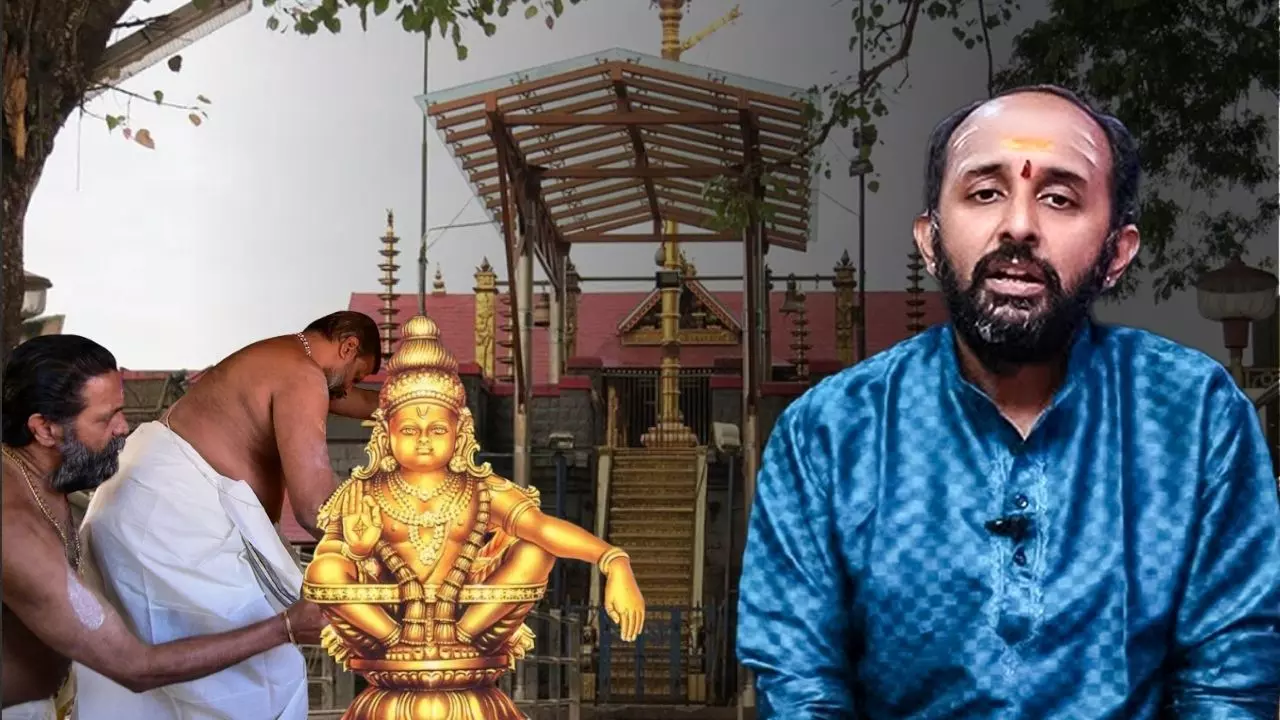
Sabarimala missing gold signals deeper systemic flaws, says Aravind Subramanyam | Interview
Ancient records preserved heritage, but modern lapses risk history and faith. How deep does the problem go?

The Federal spoke to Dr. Aravind Subramanyam, orator and writer, about the recent gold controversy at Sabarimala Temple. He shared insights into temple administration, the significance of sacred idols, and the wider implications for devotees, heritage, and tradition.
What do the ‘Dwarapalaka’ idols at Sabarimala Temple symbolize?
Dwarapalakas are not just ornamental idols. They serve a crucial role in guarding the sanctum sanctorum. They are offered special pujas and balis, both daily and during temple festivals. According to Kshetra Vaastu, Tantra Shastra, temple Agama, and Devaprasnam traditions, any issue concerning the Dwarapalakas signals a threat—not only to the temple’s physical security but also to its spiritual traditions and poojas.
Problems with the gold plating or coverings of these idols indicate breaches in security and disruptions to the sampradaya traditions. The Dwarapalakas are meant to protect the temple and its rituals, and any compromise is serious.
How were offerings at Sabarimala Temple traditionally recorded and safeguarded?
Historically, kings and devotees made offerings that were meticulously recorded through inscriptions. Temples like Thiruvalla Tirupati and Sri Ranganam in Tamil Nadu have jewels offered by rulers such as Krishna Deva Raya and Pandya kings, preserved for centuries.
At Sabarimala, historical records mention offerings like a diamond crown by a Pandala Raja around 300–350 years ago. While modern devotees continue to offer gold, silver, and other puja materials, documentation today is inadequate. Lapses in recording and safeguarding, including for items like the Dwarapalaka kavacham, are both surprising and concerning.
Does the missing gold indicate a broader administrative failure at Sabarimala?
Yes. This is not an isolated incident. Temple administration across India, including Sabarimala, suffers from systemic flaws. Political interference has transformed temples into government-like structures, with trustees and staff often functioning as government employees.
Legally, the deity is considered a minor, and administrators act only as caretakers. They cannot sell or manipulate the deity’s property. Yet, political influence and bureaucratic processes compromise documentation and security. Sabarimala has historically been targeted, and incidents like the 1950 fire demonstrate the consequences of inadequate security measures.
How serious are the Kerala High Court’s observations on systemic flaws?
The High Court’s observations are significant. Contemporary jewelry and offerings are not properly documented or safeguarded. Historically, records like Krishna Deva Raya’s precious stone-studded offerings at Tirumala provide cultural, political, and religious context.
Lack of documentation today risks losing valuable historical details for future generations. While some items, such as the Thiruvaaparamm held with the Pandalam royal family, remain safe, neglecting records for the Dwarapalaka kavacham is worrying.
Will this controversy affect devotees’ faith in Sabarimala Temple?
Incidents like these erode public trust. Devotees begin to doubt whether their offerings reach the deity. The very purpose of offerings is to honor and adorn the deity. When lapses occur such as taking offerings into safekeeping and later melting them into bullion it undermines faith and discourages donations.
The Dwarapalakas’ duty is to safeguard temple traditions. Breaches in security or administration signal attacks on the sampradaya and heritage. The administration must include members who are knowledgeable, respectful of traditions, and committed to transparency.
Should Sabarimala Temple administration be free from political control?
Absolutely. This is not just about politics; it is about ideology. Individuals who do not believe in God or the system of worship should stay out of temple administration. Non-believers in key administrative positions risk undermining traditions and inviting unfortunate events.
Spiritual leaders and those knowledgeable in temple practices should manage temples. Their understanding of rituals, heritage, and devotion is essential to preserving sacred traditions and maintaining the sanctity of the temple.
The content above has been transcribed from video using a fine-tuned AI model. To ensure accuracy, quality, and editorial integrity, we employ a Human-In-The-Loop (HITL) process. While AI assists in creating the initial draft, our experienced editorial team carefully reviews, edits, and refines the content before publication. At The Federal, we combine the efficiency of AI with the expertise of human editors to deliver reliable and insightful journalism.

